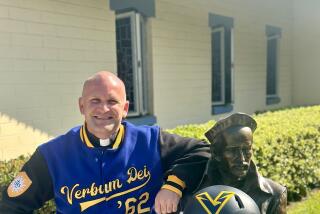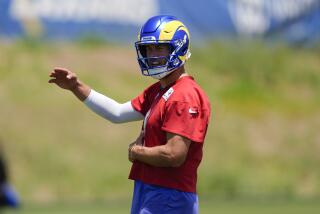Father Casassa: Educator, Builder of University : Priest Who Helped Unite Loyola Marymount Honored on His 75th Birthday
- Share via
He has an Italian name, an Irish face, a courtly manner, a highly intelligent and open mind and a reputation far and wide for achievements--in education, human relations, ecumenism and civil rights.
He is Father Charles S. Casassa SJ, chancellor emeritus of Loyola Marymount University, an institution that owes its present stature in the Southland educational community in large part to him.
Aided in Merger
It was Casassa who, with Sister Raymunde McKay of the Religious of the Sacred Heart of Mary, put together the merger of Loyola and Marymount in 1968, giving Los Angeles a Catholic co-educational university and considerably improving the resources and programs of both institutions.
“He was a distinguished university president and the builder of Loyola Marymount,” said Harry Volk, former head of Union Bank and a prominent community leader. “Its present stature is a reflection of his work.”
Indeed, Loyola Marymount University as it exists today is largely because of Casassa. When he became president of then-Loyola University in 1949, the Jesuit institution had five buildings on its Westchester campus and one at the law school downtown; it now has 23 on the main campus and four at the law school.
Casassa takes credit for only 11, modestly pointing out those that were built under his successors as president and chancellor or through the efforts of the sisters--but he is still out making friends and raising funds for the university.
Benefit Dinner
Even his 75th birthday party tonight will be not only a tribute to Casassa but a benefit for LMU. The black-tie dinner this evening at the Beverly Wilshire will raise funds for the Charles S. Casassa Conference Center in the planned Hilton School of Business, to be built on newly acquired land at the Westchester campus.
Born in San Francisco on Sept. 23, 1910, Charles Casassa has devoted his life to his God (he was ordained a Jesuit priest in 1938), his fellow man and his beloved Loyola Marymount University, which he served as president from 1949 to 1969, as chancellor from 1969 to 1984 and as chancellor emeritus since then.
He admits to a fondness for long walks, sports on television and a game of bridge, but one wonders when the man has time for such pursuits.
In a wide-ranging interview in his office in Leavey Center at LMU, Casassa spoke of his current duties as chancellor emeritus: the ever-continuing fund raising, representing LMU in the community and following pending legislation in Sacramento and Washington that affects education.
He concedes that the future of independent colleges may be somewhat precarious, but he is nonetheless optimistic.
“No one doubts that the Harvards and Yales are going to survive,” he said, “and in my opinion the good small schools that have sound financial management will survive. Some will lose because they don’t have the financial support and the costs of education are rising, but the majority will survive.”
Casassa also spoke of Loyola Marymount University--past, present and future. Typically, he tended to focus on the future and discussed the proposed use of 28 acres acquired recently, of which 16 to 18 acres are usable for development.
“We have acquired new property, but not to increase our size,” he said. “We want to increase the number of residential students, which are about 42% of the student body now; we want to get that up to 72% or 73%. So we hope to build a couple of residence halls and a commons or cafeteria, some kind of eating facilities.
“We also will put up a separate building for business administration.
“We don’t want to be much above 3,500 undergraduates; that is a good size. If we get beyond that we might lose one of our characteristics, our close personal relationship with students. If we have 10,000, that is gone; if we have 20,000 there is no hope.
“With 3,500 we can have adequate faculty and adequate counseling. Close personal care of the student has always been a goal of the Jesuits, back to St. Ignatius himself.”
Casassa also said that LMU is determined, as are other prominent institutions, to stress quality of education.
‘Slipped Badly’
“From the mid-’60s almost to the present the quality of higher education has deteriorated, and markedly so,” he said. “There now is a surge to bring back quality and excellence to education. We have slipped badly, and we should not be doing remedial work in college. But it is a long debate: How to define quality and how to improve it.
“There is tremendous concern over the basics. How do you attack the basics? What should the core curriculum be in the next 50 years? There will be a fight over that. . . .
“Take the matter of studying a foreign language. Some schools dropped the requirement for a number of years. But international trade is now a big item. I look to see more stress on foreign languages, beginning in high school or even earlier.
“I think that schools of business administration will have to put emphasis on foreign languages. For the first time here at Loyola Marymount we are offering some classes in Japanese. It was rare to have Oriental languages in other years but we are developing them now. There is an opportunity for schools in California to stress Oriental languages as more and more of our trade focuses on the Pacific Rim.”
LMU seeks to maintain flexibility in its master’s degree programs, Casassa said.
“We have added some, dropped some. We haven’t set any limit,” he said. “Most of our business administration and engineering master’s programs are taught in late afternoon. Many of those students are coming from jobs, with their companies paying part of the tuition.
“We also made the decision some years ago not to go into doctoral programs. No. 1, we are surrounded by outstanding graduate schools--UCLA, Caltech, Claremont. No. 2, they are highly expensive. The faculty can handle only a very limited number of students. If we can prepare our undergraduate students to get into good graduate schools, that we are proud of.
‘Most Expensive’
“We prepare a large number for law school and the health sciences. The last thing we’ll start is a medical school. That is the most expensive thing in the world.”
Only four of the nation’s 28 Jesuit universities have medical schools, Casassa said, noting that Marquette has turned its medical school over to the state of Wisconsin--”it was just too expensive.” He also said that all of the nation’s 28 Jesuit colleges and universities are now co-educational but that Loyola Marymount is an unusual “hybrid” of two previously existing schools.
Asked if Jesuits of former days might disapprove of their institutions becoming co-ed, Casassa said:
“No. Many Jesuits of my era looked to the day when our colleges would be co-educational. The opposition was not from the Jesuits but from the hierarchy.”
A source familiar with the background said that archdiocesan officials opposed the Loyola-Marymount merger and that “Casassa broke some ground. . . . He was able to get very strong support from some very powerful Catholics in the laity.”
Religious or laity, Catholics or not, Casassa has firm friends and prestigious admirers in the community. Dr. Franklin Murphy, chairman of the executive committee of the board of directors of Times Mirror Co., has known Casassa since Murphy first came to Los Angeles as chancellor of UCLA.
“Father Casassa is, as a human being, one of God’s noblemen,” Murphy said. “He is a remarkable human being, a major figure in the educational and community life in this city.
“When as president of Loyola, the Marymount deal was made, it was important for the financial and academic health of both institutions. The institution is therefore today a reflection of Casassa.”
Rabbi Alfred Wolf of Wilshire Boulevard Temple has known Casassa “for 25 or 30 years,” largely through Casassa’s involvement in developing inter-religious relations.
“He stuck his neck out on inter-religious relations when it was not favored by the Catholic hierarchy,” Wolf said. “Father Casassa also was the kind of Catholic who anticipated the spirit of the Vatican II Council before John XXIII convened it, and he was the first to implement it in this area at a time when others were reluctant to do so.
“He also has been deeply involved in speaking up for immigrants and refugees, for every race and every creed that might be looked down upon. He combines a soft-spoken manner with an absolute determination to do what is right.”
More to Read
Sign up for Essential California
The most important California stories and recommendations in your inbox every morning.
You may occasionally receive promotional content from the Los Angeles Times.










